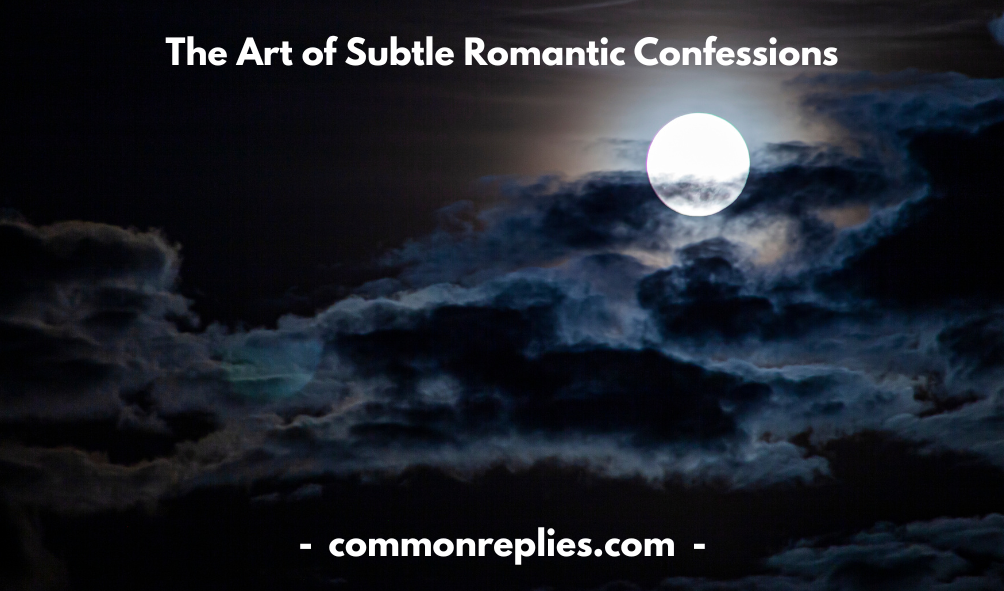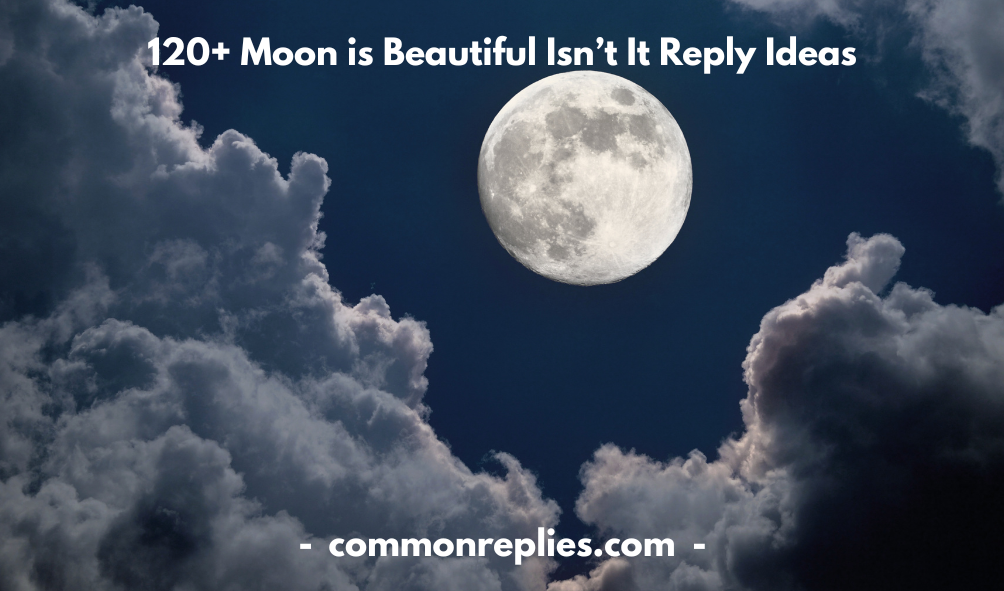If you’ve ever been on the receiving end of the phrase “The moon is beautiful, isn’t it?” you might have wondered, what exactly do I say back? Is it a compliment? A metaphor for something deeper? Or just a lovely comment on the night sky? The truth is, this phrase is loaded with cultural significance, especially in Japan, and knowing how to respond can add a touch of romantic magic to your conversations.
In this article, we’ll explore the deeper meaning behind “The moon is beautiful, isn’t it?” and provide you with the perfect replies — whether you’re feeling romantic, witty, or just want to keep things friendly.
Understanding the Cultural Significance of the Phrase
- “In Japan, it’s a way of expressing admiration in a subtle and poetic manner.”
- “It’s not just about the moon; it’s a way of conveying deeper feelings.”
- “In many cultures, the moon is seen as a symbol of beauty, and this phrase reflects that.”
- “It’s interesting how something as simple as the moon can carry such profound meaning.”
- “This phrase is part of a larger tradition of indirect communication in Japanese culture.”
- “The phrase emphasizes beauty in simplicity, a core value in Japanese aesthetics.”
- “This is often said when someone wants to express affection without being overly direct.”
- “In Japanese literature, the moon has long been a symbol of unattainable beauty.”
- “The moon serves as a metaphor for how feelings are sometimes unspoken but deeply felt.”
- “It’s fascinating how cultural contexts shape the way we communicate admiration.”
Romantic Responses to “The Moon is Beautiful, Isn’t It?”
- “Yes, but it’s nothing compared to how beautiful you are tonight.”
- “It’s stunning, just like the way you make my heart feel.”
- “The moon may be beautiful, but you outshine it every time.”
- “It is beautiful, just like the moments we share together.”
- “Yes, the moon is beautiful, but I think the view of you is even more breathtaking.”
- “You know, I think the moon gets its charm from reflecting your light.”
- “I agree, it’s perfect, just like this moment with you.”
- “How could I not agree? The moon’s beauty is only rivaled by yours.”
- “It’s almost as if the moon is trying to compete with your radiance.”
- “Yes, it’s lovely—but it doesn’t hold a candle to your smile.”
Non-Romantic Replies to the Moon Compliment
- “It sure is! I love how peaceful the night feels.”
- “Yes, the moon always has a way of making everything look calm.”
- “The moon’s beauty makes me appreciate the simple things in life.”
- “Definitely. It’s a great night to reflect on things.”
- “Agreed. There’s something soothing about looking at the moon.”
- “It’s nice to just pause and enjoy the peacefulness of the night.”
- “Yes, it’s the perfect night for stargazing and taking it easy.”
- “I’ve always found the moon calming, don’t you?”
- “The moon is beautiful, but I’d say the stars are just as captivating tonight.”
- “I agree, it’s a clear night, and the view is just perfect.”
The Influence of Japanese Language on the Phrase
- “In Japanese, indirect expressions like this are common to convey deeper emotions.”
- “It’s fascinating how Japanese uses the moon to express romantic or subtle feelings.”
- “In Japan, saying something poetic like this allows for unspoken communication.”
- “The phrase captures the essence of Japanese culture, where feelings are often implied rather than directly stated.”
- “In the Japanese language, the moon often symbolizes beauty and unattainability, making this phrase especially poignant.”
- “This phrase is so ingrained in Japanese culture that it carries layers of meaning, especially for those who understand its history.”
- “In Japanese literature, the moon is a metaphor for longing, which is reflected in this phrase.”
- “The moon here represents more than just its physical beauty—it’s about the emotions that it evokes.”
- “In Japanese tradition, the moon symbolizes something pure and unattainable, which adds depth to the compliment.”
- “This is a beautiful example of how language and nature are intertwined in Japanese poetry.”
Philosophical Interpretations of “The Moon is Beautiful, Isn’t It?”
- “The moon, in its beauty, represents the fleeting nature of life and moments of stillness.”
- “Isn’t the moon just like life itself—beautiful, constant, yet constantly changing?”
- “The moon’s beauty is a reminder that there’s beauty in things that are far beyond our grasp.”
- “Perhaps the moon symbolizes our human desire to seek something beyond ourselves, something we can never fully attain.”
- “It’s a statement that invites us to look beyond the surface, encouraging a deeper understanding of the universe.”
- “The moon is a metaphor for the idea that beauty exists in things that are often taken for granted.”
- “Maybe the moon represents the mysteries of life—there’s always more beneath the surface.”
- “It’s fascinating that something so far away can make us feel so connected to the world around us.”
- “The moon’s beauty reflects the quiet, unspoken emotions we carry within ourselves, deep and often unseen.”
- “The moon reminds us that beauty is not always about proximity; sometimes, it’s about distance and longing.”
How to Respond to “The Moon is Beautiful, Isn’t It?” in Different Languages
- Spanish: “Sí, la luna está impresionante esta noche, como siempre.” (Yes, the moon is stunning tonight, as always.)
- French: “Oui, c’est la plus belle vue du ciel.” (Yes, it’s the most beautiful sight in the sky.)
- Japanese: “はい、月は本当に美しいですね。” (Yes, the moon is really beautiful, isn’t it?)
- Italian: “Sì, la luna è magica stasera.” (Yes, the moon is magical tonight.)
- German: “Ja, es fühlt sich fast wie ein Gedicht an.” (Yes, it almost feels like a poem.)
- Chinese (Mandarin): “是的,月亮今晚特别明亮。” (Yes, the moon is especially bright tonight.)
- Russian: “Да, она просто завораживающая.” (Yes, it’s simply mesmerizing.)
- Arabic: “نعم، القمر في هذه الليلة مذهل.” (Yes, the moon is amazing tonight.)
- Portuguese: “Sim, ela ilumina tudo ao redor.” (Yes, it lights up everything around us.)
- Korean: “네, 정말 아름다운 달이에요.” (Yes, it’s such a beautiful moon.)
The Role of Nature in Romantic Expressions
- “The moon and the stars are perfect companions for a love story.”
- “Nature, especially the moon, brings out the poetry in our hearts.”
- “Nothing says romance like a walk under a starry sky, with the moon as your witness.”
- “The gentle moonlight always seems to make everything feel more intimate.”
- “When you are in nature, the simple beauty of the moon can stir up deep emotions.”
- “Nature’s beauty, especially the moon, has always been a muse for lovers.”
- “There’s something timeless about sharing a moment with someone under the moon’s glow.”
- “The quiet beauty of the moonlight makes even the simplest moments feel special.”
- “In nature, we find the perfect backdrop for love — the moonlight whispers what words cannot.”
- “Romantic moments become magical when nature, and especially the moon, is involved.”
Popularity of “The Moon is Beautiful, Isn’t It?” in Modern Culture
- “This phrase has become a symbol of quiet admiration and affection.”
- “In pop culture, ‘The moon is beautiful, isn’t it?’ represents subtle romance.”
- “It’s a phrase that is shared between lovers and romantics across the globe.”
- “People use it as a poetic expression of beauty, love, and admiration.”
- “Movies and TV shows have adopted this line to convey romantic tension.”
- “It’s widely used in social media captions to share romantic or contemplative moments.”
- “This phrase represents the delicate art of conveying deep affection without overt words.”
- “It has transcended language barriers, becoming a universal expression of love.”
- “The phrase has gained a kind of mystique and romance, especially in digital culture.”
- “Many poets and songwriters use this phrase to symbolize unspoken emotions.”
Using the Phrase in Literature and Poetry
- “In literature, ‘The moon is beautiful, isn’t it?’ symbolizes the quiet beauty of love.”
- “This phrase is often used in poetry to convey the elegance and tranquility of romantic moments.”
- “It is a simple yet profound expression of admiration, commonly found in love poems.”
- “The moon is a metaphor for unspoken emotions in many literary works, with this phrase being a prime example.”
- “Writers use this phrase to evoke a sense of intimacy between characters without needing to say much.”
- “In classical poetry, the moon often represents the unattainable, making this phrase both romantic and melancholic.”
- “The phrase has inspired countless verses about the delicate balance between beauty and fleeting moments.”
- “It speaks to the power of nature and how it can amplify emotional connections in stories.”
- “In literature, the moon’s glow is often described as illuminating the deeper truths of human connection.”
- “Through this line, poets capture the magic of quiet moments shared under the night sky.”
The Emotional Impact of the Phrase
- “The phrase makes you feel a sense of warmth and connection with the person who says it.”
- “It has a calming and reflective effect, encouraging you to pause and appreciate the beauty around you.”
- “When someone says, ‘The moon is beautiful, isn’t it?’ it can stir up feelings of nostalgia and longing.”
- “There’s a certain sweetness in hearing this phrase, as it invites you to share a quiet, intimate moment.”
- “It brings an emotional depth to any situation, making it feel more meaningful.”
- “The phrase subtly conveys affection, making the recipient feel cherished and appreciated.”
- “It triggers a moment of reflection about the fleeting nature of time and beauty.”
- “The simplicity of the phrase carries an emotional weight, highlighting how small moments can carry so much meaning.”
- “It has a soothing, almost therapeutic effect on the heart, reminding you of nature’s calming influence.”
- “Hearing this phrase can remind you of the simplicity of love, making it feel both magical and comforting.”

The Art of Subtle Romantic Confessions
- “It is, just like the way you make everything around you brighter.”
- “It’s even more beautiful when shared with someone special like you.”
- “You know, I think the moon shines just a little bit brighter when you’re around.”
- “I think you have a way of making the simplest things seem extraordinary.”
- “I agree… but I think it’s the moon’s glow that reminds me of you.”
- “It’s as if the moon knows how to mirror the beauty that you bring into my life.”
- “Funny, I was just thinking how the moon always seems a little less lonely when you’re here.”
- “It’s like the moon itself is trying to tell me how beautiful you are.”
- “The moon is stunning, but I can’t help but think it competes with the beauty of your smile.”
- “I always find that the most beautiful things are those I get to experience with you.”
How to Reply to “The Moon is Beautiful, Isn’t It?” in a Friendly Way
- “Definitely! It’s one of those nights when you just want to keep looking up.”
- “It sure is! Makes you stop and appreciate the little things, doesn’t it?”
- “Yes, it’s one of those perfect nights! Nature always has the best shows.”
- “I think it’s been showing off tonight!”
- “Absolutely! It’s like a reminder to slow down and enjoy the view.”
- “It really is! I don’t get how it always manages to look so magical.”
- “Yeah, it’s amazing. Do you think it looks bigger than usual tonight?”
- “I couldn’t agree more! It feels like the perfect end to a good day.”
- “It does have its charm tonight, doesn’t it? Reminds me to appreciate the sky.”
- “Yep, I’m glad you pointed it out! I almost forgot to enjoy the view.”
The Moon and Its Symbolism in Relationships
- “The moon has always represented constant love, doesn’t it? Just like how I feel about you.”
- “In many cultures, the moon is a symbol of patience and loyalty—just like true love.”
- “The moon reminds me of how relationships evolve—beautiful, mysterious, and full of surprises.”
- “Much like the moon, love has its phases, but it always returns full and bright.”
- “The moon is a perfect symbol of how we’re all connected, even when we’re apart.”
- “Its phases reflect how we grow together in a relationship, sometimes waxing and waning, but always coming back to each other.”
- “I see the moon as a symbol of enduring love—it’s always there, no matter the distance.”
- “The moon is the best reminder that even in darkness, there’s always light waiting to guide us back to each other.”
- “It’s incredible how the moon can shine so brightly, just like the way you light up my life.”
- “Much like our relationship, the moon reflects the constant ebb and flow of love, always in motion but always enduring.”
How to Use the Phrase in Casual Conversations
- “I was just admiring the moon! It’s one of those nights that makes you appreciate nature.”
- “You know, the moon looks especially great tonight—reminds me of how peaceful it is just being outside.”
- “I was thinking about how calming it is to watch the moon rise. It’s one of my favorite simple pleasures.”
- “I love how the moon just seems to be in the background, yet it has such a calming presence.”
- “On a night like this, the moon really stands out, doesn’t it? It makes everything feel a little quieter.”
- “I’ve always loved looking at the moon. It’s like a reminder that there’s so much beauty to be found in the world.”
- “Isn’t it crazy how the moon is always up there, unchanged by everything else going on in the world?”
- “I feel like nights like these make you appreciate the little things—like how amazing the moon looks tonight.”
- “I guess we’re both on the same wavelength, huh? The moon’s definitely a vibe tonight!”
- “I love how the moon looks from here—it’s a good excuse to take a breather and appreciate what’s around us.”
The Historical Background of “The Moon is Beautiful, Isn’t It?”
- “Did you know this phrase is actually a famous translation of a Japanese literary quote? It’s pretty poetic!”
- “This phrase has been used in Japanese culture for ages as a way to express affection in a subtle way.”
- “The phrase has such deep roots in Japanese culture, where it’s often used to show appreciation without being too direct.”
- “In the early 20th century, a writer named Natsume Sōseki popularized the phrase as a metaphor for love.”
- “Interestingly, this simple phrase reflects how different cultures convey romance in a more reserved, thoughtful manner.”
- “The moon has always been a symbol of beauty in different cultures, and this phrase is just one example of how it’s been romanticized.”
- “It’s kind of fascinating how this phrase has crossed over into popular culture, being used for everything from literature to modern songs.”
- “What’s even cooler is that this phrase was originally about expressing deep affection without saying it outright—very poetic!”
- “It’s amazing how something as simple as the moon can carry so much meaning across generations, don’t you think?”
- “The phrase perfectly captures how love has been conveyed in Japan—subtle, yet profound.”
The Aesthetic Value of the Moon in Different Cultures
- “Indeed, the moon has inspired poets, artists, and dreamers across the world.”
- “Absolutely, it’s like nature’s art piece in the sky, a symbol of serenity.”
- “In many cultures, the moon is a symbol of beauty, peace, and the passage of time.”
- “Yes, the way the moon shifts through phases is so mesmerizing in every culture.”
- “In some traditions, the moon represents femininity and grace, which makes it even more enchanting.”
- “It’s like the moon reflects the soul of the night, holding a special place in cultural stories.”
- “It’s fascinating how different cultures view the moon as a divine presence in the sky.”
- “The moon’s influence on folklore and mythology is so captivating, each culture has its own take on its beauty.”
- “You can see its significance in art across centuries — from paintings to ancient texts.”
- “It’s true, every culture has its own beautiful way of honoring the moon’s glow and mystery.”
The Moon’s Connection to Love and Affection
- “Yes, the moon often symbolizes the constant and enduring nature of love.”
- “Just like the moon, love shines brightest during the darkest times.”
- “It’s the perfect metaphor for love — steady, beautiful, and unchanging.”
- “The moon’s light reminds me of how love illuminates our lives, even in tough moments.”
- “Love, like the moon, may go through phases, but it’s always there.”
- “Indeed, the moon always seems to show up when two people are in love, like a silent witness.”
- “The moon and love are both mysterious, full of depth and wonder.”
- “Under the moonlight, everything feels more magical, just like love makes life feel more vibrant.”
- “Yes, there’s something romantic about how the moon can bring two hearts together under the same sky.”
- “It’s fascinating how the moon has always been tied to expressions of love in songs and poems.”
Responses to “The Moon is Beautiful, Isn’t It?” in Pop Culture
- “It’s one of those timeless lines that pop culture has forever connected with romance.”
- “Yes, the moon’s beauty was immortalized in ‘Your Name’ — a perfect symbol for longing and connection.”
- “I’ve always loved how pop culture elevates simple things like the moon into emotional symbols.”
- “Definitely! This line from ‘Your Name’ was unforgettable and has since been referenced in so many ways.”
- “Absolutely, the moon has become iconic in so many songs, movies, and even memes!”
- “Yes, it’s such a classic line that’s still used in romantic settings and pop culture references.”
- “The moon is a staple in pop culture for its mystical and ever-present nature.”
- “I love how this simple line is so deeply ingrained in pop culture now, especially for romantic moments.”
- “Yes, the line has become a cultural meme that symbolizes deep feelings of affection.”
- “It’s amazing how this line resonates even today, making the moon a timeless symbol in modern love stories.”
The Use of Natural Imagery in Communication
- “Nature’s elements, like the moon, trees, and stars, make our conversations feel more grounded and poetic.”
- “When we speak of the moon, it’s not just a celestial body; it’s a metaphor for all things that feel eternal and beautiful.”
- “Using the moon in communication brings a sense of calm and depth to any conversation.”
- “Nature always makes a conversation feel more meaningful, especially when we bring in the moon or the stars.”
- “Describing feelings using nature’s imagery makes those feelings more vivid and real.”
- “Natural imagery connects us with the world around us, making our expressions more relatable and emotional.”
- “The moon often represents silence and understanding, and using it in conversation does the same.”
- “It’s amazing how a simple mention of the moon can evoke such complex emotions.”
- “Nature speaks to us on a deep level, and the moon is a perfect example of how beauty can communicate so much.”
- “By referencing the moon in communication, we tap into centuries of shared meaning and emotion.”
Exploring Alternative Romantic Expressions Beyond the Moon
- “The stars have a similar beauty to the moon, and they can symbolize distance and longing in love.”
- “How about comparing love to the endless sky — vast, infinite, and filled with possibility?”
- “A sunset could represent the beauty of love, as it’s always bittersweet and fleeting, yet stunning.”
- “The ocean’s waves can symbolize the rhythm and ebb of love, always returning, never truly leaving.”
- “The sunrise is a great symbol for hope in love, showing how each new day is a fresh start.”
- “The vastness of the universe, full of endless stars, mirrors the limitless nature of deep affection.”
- “A flower blooming could be an ideal symbol for love, representing growth, beauty, and nurturing.”
- “The wind’s unpredictable nature could symbolize the passion in love — free and untamed.”
- “The gentle rain could symbolize love’s comforting presence, refreshing and always needed.”
- “How about the warmth of the sun as a symbol of love, bringing light and life to everything it touches?”
How to Use This Phrase in Real Life
Text, DM, or In Person
Whether you’re texting, sending a direct message, or sharing a moment in person, this phrase can work beautifully in any medium. Just make sure your tone matches the context. If you’re texting, keep it sweet and short; if you’re in person, you might want to add a little more emphasis on body language or your eyes.
When the Timing Feels Right
The timing of saying or replying to “The moon is beautiful, isn’t it?” matters. You wouldn’t want to bring it up in a hurry or at a time that doesn’t fit the mood. Wait for that perfect, quiet moment when you’re enjoying the night sky together.
Variations of the Phrase and Their Meanings
“The Night is Beautiful, Isn’t It?”
Sometimes, the phrase can be expanded to encompass the entire night, not just the moon. This can give it a broader, more inclusive meaning.
“I Like Looking at the Stars With You”
This variation is more personal and emphasizes the shared experience of stargazing, making it a perfect response for someone special.
When to Use Humor and When to Be Serious
Humor can add a playful touch to your response, but know when to take it seriously. If the other person is being heartfelt, a humorous reply might feel dismissive. On the other hand, if the mood is light and playful, humor can keep things fun.
The Psychological Impact of Romantic Phrases
Romantic phrases, like “The moon is beautiful, isn’t it?” tap into deep emotional responses. They evoke feelings of warmth, affection, and connection. They remind us of the importance of shared moments and appreciation for beauty, both in nature and in relationships.
Using AI to Generate Creative Replies
If you’re looking for some inspiration or struggling to find the right words, AI can help generate creative responses based on your preferences. Whether you want a sweet, funny, or poetic reply, AI tools can provide endless options to choose from.
Conclusion
“The moon is beautiful, isn’t it?” is more than just a comment on the night sky. It’s a poetic, thoughtful way of expressing feelings that are often difficult to articulate. Whether you’re in a romantic relationship or simply enjoying a peaceful moment with someone, how you respond to this phrase can speak volumes. From sweet and romantic to witty and lighthearted, there’s a perfect reply for every situation.
Remember, the beauty of this phrase is its subtlety. So, take a moment to appreciate the depth and sentiment behind it — and don’t be afraid to craft a response that reflects how you truly feel.
FAQs
1. What does “The moon is beautiful, isn’t it?” mean in Japan?
In Japan, “The moon is beautiful, isn’t it?” (月が綺麗ですね, tsuki ga kirei desu ne) is often used as a subtle confession of love. It was popularized by the Japanese writer Natsume Sōseki as a poetic way to express affection without directly saying “I love you.” It carries a romantic implication and is meant to convey admiration and deep feelings for the person.
2. How do I reply to “The moon is beautiful, isn’t it?” if I’m not romantically interested?
If you’re not interested in a romantic response, you can keep your reply neutral or friendly. For example, you could say, “Yes, the sky is amazing tonight!” or “It really does look peaceful, doesn’t it?” These responses acknowledge the beauty of the moon without adding any romantic undertones.
3. Can I use “The moon is beautiful, isn’t it?” in casual conversations?
Yes, you can use this phrase in casual conversations, especially when talking about the beauty of the night sky. However, if you want to add a romantic twist, it’s often used in more intimate or meaningful settings. If you’re chatting casually, it can simply be a nice comment about the night.
4. What are some romantic replies to “The moon is beautiful, isn’t it?”
If you want to reply romantically, you could say things like:
- “Yes, just like you.”
- “It’s even more beautiful with you here.”
- “I think the moon is jealous of how lovely you look tonight.” These replies keep the mood romantic and sweet.
5. Is there a specific time to use “The moon is beautiful, isn’t it?”
The phrase is best used when you’re sharing a quiet, intimate moment with someone, such as during stargazing or a peaceful evening. It’s meant to convey deep emotions in a subtle and poetic way, so the timing should feel natural and reflective. It’s not ideal for a rushed or casual conversation.










